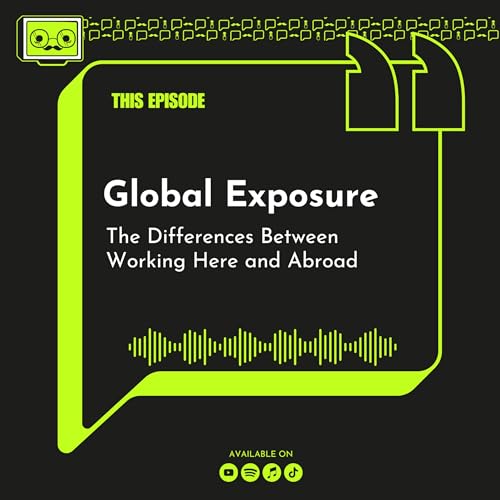
106 - Global Exposure
Échec de l'ajout au panier.
Échec de l'ajout à la liste d'envies.
Échec de la suppression de la liste d’envies.
Échec du suivi du balado
Ne plus suivre le balado a échoué
-
Narrateur(s):
-
Auteur(s):
À propos de cet audio
On this episode, we have Jason Torres, Miguel Fermin, and Rafael Quisumbing joining us to discuss "Global Exposure" and the differences between working here in the Philippines and abroad.
The tech world has gone borderless, creating new career paths and challenges. This episode explores the key differences and opportunities of working for a company in the Philippines versus a global or international one. Our guests will share insights on cultural nuances, salary and benefits, work-life balance, and career growth trajectories in both local and international settings. We'll provide practical advice for IT professionals looking to expand their horizons, whether by working remotely for a foreign company or pursuing a career abroad.
What are some of the biggest cultural or professional differences you’ve observed between working for a local company and a global one? (Generalization)
One of the biggest differences is the approach to communication and hierarchy. Local companies may have a more structured, hierarchical communication style, while global companies often favor a more flat and direct approach. There are also differences in professional pace; global teams often operate with a greater sense of urgency due to time zone differences and tight international deadlines. Lastly, a diverse global team exposes you to different work ethics and perspectives, fostering a more adaptable and inclusive professional mindset.
How do compensation, benefits, and work-life balance typically compare when you’re working for a company based in another country? (Generalization)
Compensation and benefits are generally higher with global companies, especially those based in developed countries. This can include better salaries, more comprehensive health benefits, and clearer opportunities for bonuses or equity. However, the work-life balance can vary. While some global companies promote flexibility, the demands of working across different time zones might extend your work hours. It is also worth noting that benefits like paid time off and holidays may align with the company's home country, not the employee's, which can be a point of adjustment.
What are the biggest challenges or hurdles to getting a job with a global company or pursuing a career abroad? (Generalization)
One of the biggest hurdles is visa sponsorship and work permits, which can be a complex and lengthy process. For remote roles, competition is fierce, and showcasing your skills and experience to a global audience is key. You might also face the challenge of proving that your local experience and credentials are on par with international standards. Additionally, the initial adjustment to a new work culture, especially in terms of communication norms and professional expectations, can be a significant hurdle to overcome.
What’s one piece of advice you’d give to someone working in the Philippines who wants to gain more global exposure? (Generalization)
The best advice is to start building a global brand for yourself right now. This means actively contributing to open-source projects, participating in international tech communities online, and building a professional portfolio that is accessible to anyone, anywhere. Focus on gaining highly sought-after skills like cloud computing, AI, or cybersecurity. By demonstrating your expertise on a global stage, you can attract opportunities without even having to leave your current location.


